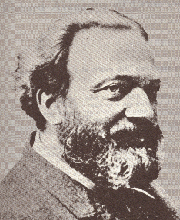Richard Avenarius
| Richard Avenarius | |
|---|---|
 |
|
| Born | November 19, 1843 Paris |
| Died | August 18, 1896 Zurich |
| Alma mater |
University of Zurich University of Berlin Leipzig University |
| Era | 19th-century philosophy |
| Region | Western philosophy |
| School |
Empirio-criticism (Critical positivism) |
| Institutions |
Leipzig University University of Zurich |
|
Main interests
|
Empirical knowledge, philosophy of science |
|
Notable ideas
|
Empirical criticism |
|
Influenced
|
|
Richard Ludwig Heinrich Avenarius (November 19, 1843 – August 18, 1896) was a German-Swiss philosopher. He formulated the radical positivist doctrine of "empirical criticism" or empirio-criticism.
Avenarius attended the Nicolaischule in Leipzig and studied athe University of Zurich, Berlin, and the University of Leipzig. At the University of Leipzig, he received the Doctor of Philosophy in 1868 with his thesis on Baruch Spinoza and his pantheism, obtained the habilitation in 1876 and taught there as Privatdozent. One year later, he became professor at the University of Zurich. He died in Zurich in 1896.
Avenarius believed that scientific philosophy must be concerned with purely descriptive definitions of experience, which must be free of both metaphysics and materialism. His opposition to the materialist assertions of Karl Vogt resulted in an attack upon empirio-criticism by Vladimir Lenin in the latter's Materialism and Empirio-criticism.
Avenarius' principal works are the famously difficult Kritik der reinen Erfahrung (Critique of Pure Experience, 1888–1890) and Der menschliche Weltbegriff (The Human Concept of the World, 1891) which influenced Ernst Mach, Ber Borochov and, to a lesser extent, William James.
...
Wikipedia
